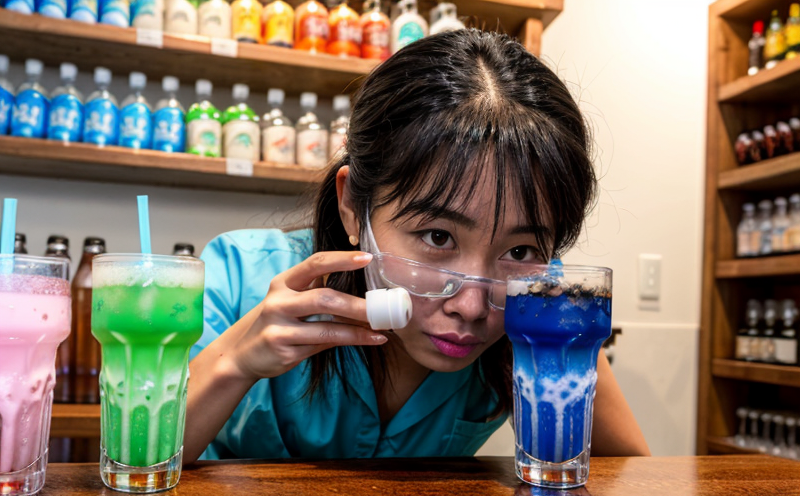Codex Alimentarius Safety Testing of Carbonated Drinks
The Codex Alimentarius Commission is a joint WHO and FAO body responsible for developing global standards, guidelines, and codes of practice related to food safety and quality. The Codex Alimentarius Safety Testing of Carbonated Drinks ensures that beverages meet the highest international standards set by Codex. This testing is essential in safeguarding consumer health and ensuring product integrity.
Carbonated drinks are popular worldwide due to their refreshing taste, variety, and convenience. However, they can pose risks if not produced under strict hygiene conditions and handled properly during distribution and storage. The Codex Alimentarius Commission provides a framework for harmonizing food standards globally to protect the health of consumers and facilitate international trade.
The testing process involves assessing various parameters that determine the safety and quality of carbonated drinks, including microbiological contaminants such as Listeria monocytogenes, Salmonella spp., and E. coli O157:H7. These pathogens can cause severe illness or even death if present in significant quantities. Additionally, the presence of spoilage organisms like yeast and mold is crucial to monitor as it affects product shelf life and consumer perception.
The testing procedure typically follows a series of steps: sample collection, preliminary examination, isolation and identification of microorganisms, quantitative analysis, and final confirmation using appropriate diagnostic kits or methods. This comprehensive approach ensures accurate detection and quantification of potential hazards.
For quality assurance purposes, laboratories must adhere to strict ISO standards such as ISO 17025, which governs the technical requirements for the competence of testing and calibration laboratories. Compliance with these guidelines ensures reliable results and builds trust among stakeholders.
The Codex Alimentarius Safety Testing process is not only beneficial for manufacturers but also crucial for retailers and consumers alike. It helps ensure that products meet international safety criteria, thereby protecting public health while fostering fair trade practices.
| Parameter | Description |
|---|---|
| Bacterial Count | The number of viable bacteria present in a unit volume or weight of food. This helps assess the overall hygiene level during production. |
| Pathogen Detection | Identification and quantification of harmful microorganisms like Salmonella, E. coli, and Listeria to prevent illness outbreaks. |
| Spoilage Organism Monitoring | Detection of molds and yeasts that indicate spoilage during storage or distribution. |
By adhering to the Codex Alimentarius guidelines, manufacturers can ensure their products meet international safety standards. This not only enhances consumer confidence but also facilitates export opportunities by meeting foreign regulatory requirements.
In conclusion, the Codex Alimentarius Safety Testing of Carbonated Drinks is vital for maintaining food safety and quality at every stage from raw materials to finished product. It provides a robust foundation for protecting public health while promoting responsible business practices.
Why It Matters
The importance of Codex Alimentarius Safety Testing cannot be overstated, especially when dealing with carbonated drinks which are consumed by millions daily worldwide. Ensuring these beverages meet international safety standards is critical for several reasons:
- Consumer Health Protection: Pathogens in carbonated drinks can lead to severe illnesses or fatalities if not properly controlled.
- Brand Reputation: A single contaminated batch could tarnish a brand's reputation and lead to long-term damage.
- Legal Compliance: Non-compliance with Codex Alimentarius can result in legal action, fines, and sanctions.
- Market Access: Meeting international standards opens doors for export markets where stringent regulations apply.
In summary, compliance with the Codex Alimentarius Commission's guidelines is essential for maintaining consumer trust, ensuring regulatory compliance, protecting brand integrity, and facilitating market access. These measures collectively contribute to a safer food supply chain.
Scope and Methodology
| Parameter | Description |
|---|---|
| Bacterial Count: | Determines the number of viable bacteria in a sample using appropriate culture methods and counting techniques. |
| Pathogen Detection: | Identifies harmful microorganisms like Salmonella, E. coli, and Listeria through isolation, cultivation, and serological tests. |
| Spoilage Organism Monitoring: | Detects molds and yeasts using specific media and incubation conditions to assess spoilage potential. |
The scope of this testing includes all stages from raw material sourcing through final product packaging. Each step is meticulously evaluated to ensure no contaminants are introduced into the supply chain. This holistic approach guarantees that every batch produced meets rigorous safety standards set by Codex Alimentarius.
Testing methodologies often involve advanced microbiological techniques like polymerase chain reaction (PCR) for rapid detection of pathogens, high-performance liquid chromatography (HPLC) for analyzing chemical compounds, and scanning electron microscopy (SEM) for visual confirmation. These sophisticated tools provide precise data essential for making informed decisions about product quality.
Compliance with international standards ensures that the testing process remains consistent across different regions and laboratories. This uniformity fosters trust among various stakeholders including manufacturers, distributors, retailers, and consumers.
Benefits
The benefits of Codex Alimentarius Safety Testing extend beyond mere compliance; they offer numerous advantages to companies involved in the carbonated drinks industry:
- Enhanced Consumer Trust: Meeting international safety standards builds confidence among consumers regarding product quality and safety.
- Increased Market Opportunities: Compliance allows brands to enter new markets where stringent regulatory requirements exist.
- Improved Operational Efficiency: Regular testing helps identify potential issues early, leading to more efficient production processes.
- Reduced Risk of Litigation: Adherence to international standards minimizes the risk of lawsuits and associated costs due to product recalls or health scares.
In addition to these tangible benefits, there are intangible advantages such as increased brand loyalty and positive media coverage. By demonstrating commitment to food safety, companies can elevate their image in the eyes of consumers and stakeholders alike.





